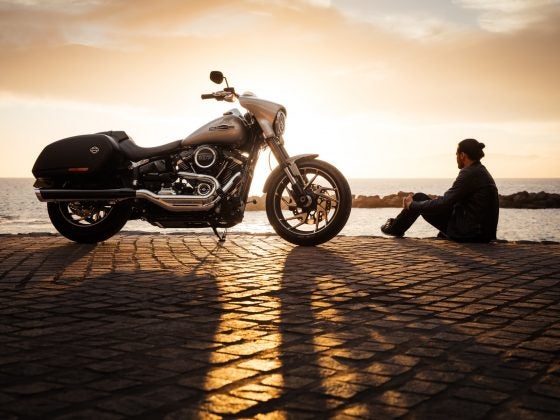Riding a motorcycle is an age-old pastime, from the era of the Indian Motocycle in 1901, to Harley Davidson in the ’70s, and now modern Ducatis and Honda CBRs. And while little about motorcycle riding has changed (except the top speeds we can achieve), there have been persistent myths over the decades that simply refuse to die.
In this article, we’ll highlight three of the most egregious myths about riding motorcycles that, if you believe them, could end up being dangerous to you or other drivers.
Myth 1: Using the front brake will tip you over.
Many people seem to believe that the front brake on a motorcycle will cause you to flip over, like you would on a bicycle. However, there’s a significant weight difference between a bicycle and a motorcycle. A motorcycle is heavy enough to withstand the force of a front-wheel brake – just imagine, if front braking at high speed caused you to flip over, why would motorcycles even come with front brakes installed?
In fact, it’s preferable to use the front brake while stopping at a high speed, while moving in a linear direction. On the other hand, you want to avoid using the front brake while turning – in fact, you want to avoid braking at all while turning. You can easily lose control of the motorcycle this way.
Motorcycles corner best while under a little throttle, so it’s best to anticipate turns and adjust your speed accordingly.
The other situation where the front brake is not recommended is on slippery surfaces – the rear brake is a better choice, because the front wheel locking up while sliding will cause you to lose control of the motorcycle.
Myth 2: It’s your choice whether or not you wear a helmet.
While some people are just intentionally skirting the law, other people actually believe that wearing a helmet on a motorcycle is a personal choice. This is false – though motorcycle laws vary by state, so you should check out your local laws to ride safely.
Currently, only three states that do not have motorcycle helmet laws – Iowa, Illinois, and New Hampshire. Nineteen other states strictly require helmets for motorcycle riders, eighteen states require helmets for riders 17 or younger, and nine states require helmets for riders 20 or younger.
However, no matter the specific laws, you really should wear a helmet. It doesn’t matter how good of a rider you believe you are – there’s always the element of chaos, and the inevitable failure, and sudden death. If you’re lucky, it’ll just be a whiplash or a concussion, but there are plenty of stories where the helmet protected the brain from serious injury.
Myth 3: You can evade and outrun the police on your motorcycle.
It’s a tempting thought, when you’re riding a superbike that can do 200+ MPH, but it can easily turn ugly for you. Simply trying to outrun a speeding ticket can turn into a high-speed chase that costs you your life, as the police are allowed to employ the most aggressive pursuit methods in the interest of public safety.
Look at the high-profile case of Scott v. Harris, who had been driving recklessly on his motorcycle at high speeds, and led the police on a high-speed chase through roads and highways. In the end, the police employed a PIT (precision intervention technique) maneuver to force Scott off the road, resulting in him becoming a quadriplegic.
The court ruled that because Harris had been endangering other road drivers, the police did not owe him any compensation for his injuries. His attorney appealed this ruling to the U.S. Supreme Court, and they upheld the original decision.
So, can you evade the police on a motorcycle? Perhaps – but is it really worth trying?













